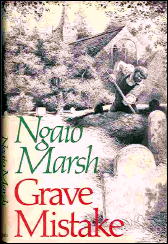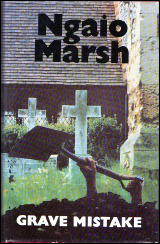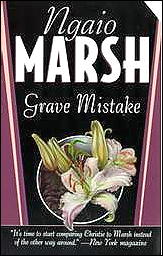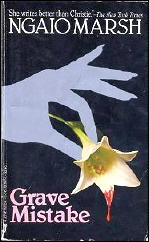Wed 5 May 2010

NGAIO MARSH – Grave Mistake. Collins Crime Club, UK, hardcover, 1978. Little Brown & Co., US, hc, 1978. Reprinted many times, in both hardcover and soft.
Published by Ngaio Marsh when she was 83, Grave Mistake certainly is a better effort than Agatha Christie’s Postern of Fate (1973), published when Christie was that same age. But it’s still a distinctly minor work by this talented author.
Grave Mistake is one of those British village mysteries that cozy-loving Americans particularly seem to enjoy reading. Several other Marsh village mysteries, most notably Overture to Death (1938), Scales of Justice (1955) and Death of a Fool (Off with His Head in the UK, 1956), are among her most popular tales. Grave Mistake is a weaker tale than those, but should still offer some enjoyment to cozy fans.
The village in Grave Mistake is Upper Quintern, one of those rural locales in classical English mystery that always seems about twenty years out of date (for example, Overture to Death feels like it should be taking place in 1918 at best and Scales of Justice and Death of a Fool in the 1930s).

Though presumably Grave Mistake takes place around 1977, it seems that the village is composed solely of wealthy, mostly jobless, women and the people who serve them. Oh, and that Greek multi-millionaire who bought up one of the local mansions and about whom no one is quite sure whether he’s quite quite. The servants are more independent here than in many of the pre-WW2 tales and competition for their services is fierce. The gardener even expects to be called “Mister” — imagine!
Marsh novels usually have a pair of winning young lovers, it seems, and we have such a pair here. Marsh provides one short scene of the couple in which she not too convincingly tries to convey the language of people born around 1960 (lamentably, the word “groovy” is uttered), but mostly her focal point is Verity Preston, a fifty-something, unmarried, intelligent, charming, sensitive playwright. If you think this might be Marsh herself, more or less, you may be on to something.

Eventually one of the local society ladies is smothered to death in the fashionable sanitarium she has checked herself into for a “rest” (shades of P. D. James’ recent novel, The Private Patient, and the doctor who owns this clinic is straight out of Marsh’s own Death and the Dancing Footman, from nearly forty years earlier) and soon enough Superintendent Alleyn shows up with Inspector Fox to restore order in the village.
Alleyn still calls his subordinate “Br’er Fox” and, even more egregious, “Foxkin”; but I suppose Fox had put up with this for 44 years and was surely nearing retirement, so he was able to restrain himself from finally snapping and throttling “Handsome Alleyn” on the spot. For their part, the posh members of the local gentry still comment on how Alleyn is so much more a gentleman than they would have expected, his being a policeman and all.
As the above may suggest, there’s plenty in Grave Mistake that would have been guaranteed to have set Raymond Chandler’s remaining teeth on edge, had be survived until 1978 and sat down to read this tale. There’s an Aunty Boo. The lovely young well-born girl is named Prunella. She calls Verity, who is her Godmother, Godma V (as in, “Godma V, it’s a stinker”). The ladies love to use the word “lolly” (“Daddy was a wizard with the lolly” actually gets said here). But, then, Marsh wasn’t writing for Chandler, was she?

My favorite character by far was the stepson of the murder victim. Nicknamed by all the gentry ladies “Charmless Claude,” he’s a feckless character, a sponging waster and loser in his late thirties (a slacker as we would say today) who is tremendous fun to read about as his ineffectual plotting comes to naught. The charming people, by contrast, I found a bit tiresome.
The mystery itself is a disappointment. It’s extremely straightforward and lacking in complexity and ingenuity, though it is fairly presented.
But I suspect many did not mind this when Grave Mistake appeared in 1978, two years after Agatha Christie had been been lost to the mystery-loving world. I imagine, rather, that most enjoyed simply immersing themselves in the cozy comforts of a classical form English mystery.
May 5th, 2010 at 8:12 pm
Not a great one, but you have to give the greats a pass toward the end — and anyway, Marsh wouldn’t have been a great deal nicer about Chandler’s PLAYBACK probably.
May 5th, 2010 at 9:02 pm
All in all, I have to say that I like the British village mystery much more than I do those that take place in urban settings.
I’d be hard pressed to estimate the overall percentage of British mysteries that actually take place in small towns and villages, or even if the percentage has changed over the years, but it would be interesting to know.
I like the point you made, though, Curt, that Marsh’s mysteries seem to take place in settings about 20 years before the fact.
Marsh wrote two mysteries after this one, Photo-Finish (Collins, 1980) and Light Thickens (Collins, 1982), which would have been when she was 85 and 87, respectively.
I’ve never read either one, I’m sorry to say. In fact, looking over her long list of titles, I think all of hers that I’ve read were written before 1960. I never enjoyed them as much as I did Christie’s, but I can’t remember reading any bad ones, either.
May 5th, 2010 at 9:59 pm
The English country village mystery is a genre in and of itself, and the very insular and often remote nature gives them a special feeling.
I don’t know if you can still do them quite the same although a few friends tell me that the Net and television aside more of these quaint places still exist than most of us would expect. After all, Pett Bottom, where James Bond lived with his aunt, was a real place.
Marsh always seemed to me the least of the big four (Christie, Allingham, and Sayers), and yet oddly the most consistent. If she never produced a tour de force she never produced a PASSENGER TO FRANKFURT or BUSMAN’s HONEYMOON either. Of the four ladies most famous tecs Alleyn is the only one you likely wouldn’t want to take a swing at after five minutes in their company in real life (and I include Miss Marple, at least as presented in the books, though I grant Curt’s point about Fox’s forbearance in regard to the Br’er Fox business).
And there are some memorable books in the mix. I read all of her late books beginning with WHEN IN ROME, and if none of them were her best work, none of them were embarrassing either.
And if her work seemed at least twenty years out of date by the end (and that’s being generous) the truth is was that was what I wanted from her.
Curt makes a good point about the reception of GRAVE MISTAKE, we were just glad to have one more Marsh. I’m reminded of the book THEY WENT THATAWAY by James Horwitz, written in 1976, and how heartened he was when writing about the great B movie cowboys to find Col. Tim McCoy was alive and still well. It’s a sort of grace moment that goes well beyond critical reception of an individual book.
May 6th, 2010 at 5:35 am
THEY WENT THATAWAY is one of my favorite books, simply because I used to do the same thing as the author with B movies. Before the video revolution I used to study the TV schedules and make sure I saw all sorts of rare and unusual movies no matter what time they were on. Now I usually can order them within a few days without the commercials.
Only on Mystery File can we jump from the British village mystery to B-westerns!
May 6th, 2010 at 6:29 pm
I think Alleyn definitely is more restrained than Lord Peter and Campion (who wouldn’t be?), though in the later Allingham books, Campion becomes so restrained as to be almost featureless (and rather dull to me). I like Alleyn on the whole, though he can get a bit precious at times for a believable British policeman (the “Foxkin” bit).
Christie was getting pretty dotty by the time of the last two books she wrote, Elephants Can Remember and Postern of Fate. They simply would not have been published if they hadn’t been written by someone with a famous name, yet they remain in print today, while so many interesting mysteries (see this site!) have been out-of-print for years.
Marsh’s later mysteries are at least competent, if not enthralling, much like the recent books by P. D. James. I recall Photo-Finish (published in 1980, when Marsh was 85)as being surprisingly good. It has another classic setting–mansion on New Zealand lake island cut off from outside world by storm–and eccentric theatrical types, which Marsh was always good at.
Marsh’s last, Light Thickens, has a great title, but is pretty weak as I recall. She died after submitting the rough draft and her British publisher, as I recollect, considered not publishing it. Apparently they had to do quite a bit of editing on it. But it sold quite well, like all her later books. She and Gladys Mitchell were the last of the great British Golden Age women detective novelists (not counting Christianna Brand and Elizabeth Ferrars, who were at the tail end of the GA), and Mitchell was never popular in the US. So when Marsh died, that great tradition really died with her.
I agree with David: she’s a strikingly consistent writer, if not always as inspired as the other Crime Queens. But I think Surfeit of Lampreys/Death of a Peer, at least, is on the same level with the best works of Sayers and Allingham, in combining the attractions of a straight novel with an interesting puzzle.
May 7th, 2010 at 2:39 pm
There’s a theory that the reason the later Marsh novels feel so dated is that, unlike the other Crime Queens, she was always an outsider. Marsh was always a visitor, rather than a resident, in the UK.
I suspect that most of her knowledge of the country was gathered between the wars. When things began to change, post-1945, she either didn’t realise or didn’t care that there had beem huge changes in society.
May 7th, 2010 at 3:01 pm
Bradstreet
I’m sure Curt is better able to respond, since he’s read her various biographies and I haven’t.
But as I’ve been reading his review and the other comments that have been left, I gather that if her work is dated — and I suspect that you’re quite right as to the reasons — it hasn’t been considered a Bad Thing. Or perhaps I should speak for myself to say, at least not by me.
On the other hand I think there’s a consensus that the the puzzle aspect of her novels decreased as time went on, and toward the end it had definitely become quite weak.
But was Marsh ever known as a true puzzle writer? In the same category as Agatha Christie, say, who almost always knocked my socks off? (Of course, who is.)
— Steve
May 8th, 2010 at 1:16 am
I think you look at a book lie Swing, Brother, Swing/A Wreath for Rivera (1949 I think), for example, and it is definitely dated. All the stuff about the nightclub lounge lizard Rivera and the horror that he’s making up to the well-born girl–characters even talk about him as that damn dago, etc.–it feels very 1930s.
I tend to agree that her village mysteries are pretty dated too, though of course that probably is one of the things, actually, that a lot of people like about them! “Hand in Glove” (1962) does have a nicely-done young thug type who is obviously a nod to the post-war spiv types, but at the same time you have this butler and cook who come straight out of the 1930s books (“my gentleman,” etc.).
Another one, Off With His Head/Death of a Fool (1956), as I recall has all this concern about cross-class marriage in a way that seems quite dated for the period (though to be fair Marsh sets the book in a very remote corner of England). P. D. James has written disparagingly of “Christie-land”, this land of the Edwardian type English villages, but it seems to me you could talk just as much, if not more, about “Marsh-land.”
Marsh was a talented writer, though, and she often makes it all entertaining, even if the puzzles aren’t always that great. I just read “Hand in Glove” and enjoyed a lot, though there really wasn’t much real detection in it and Alleyn owes the solution to a nosy dog!
July 17th, 2010 at 9:46 pm
I found this entry belatedly during a search for information on “Overture to Death”. I’d point out that Marsh could be cruelly vicious and she adored stereotypes, especially those that put her fellow women in the worst possible light. “Overture to Death” might be the worst because in that book she’s excoriating Dorothy L. Sayers, whom she loathed.
Many don’t realize that Marsh was the main impetus behind the bigoted, hateful lie (and quite a lie it was) that Sayers was a dried-up old pathetic pitiful prune who created Lord Peter so she could have a love affair without resorting to “tedious” sex. In reality, Sayers was as real and as sexually adventurous a woman as any, but she had a dark secret from her past – an illegitimate son. (Had it been known at the time that she had borne a son out of wedlock, her books would have been pulled from shelves and she would have lost her writing contract.) She was therefore extremely cagey about her personal life; most people didn’t even know that she was married. This allowed her enemies to paint her as a pathetic, pitiful, hysterical virgin who could be safely ignored. The fact that she was deeply religious bolstered this stupid assumption.
In “Overture to Death”, Marsh turns Sayers into not just one but two outrageously offensive stereotypes: Miss Campanula, a vicious harpy, and Miss Prentice, a hysterical religious nut. Both these characters are so unrealistic that the book itself suffers.
And if you’re wondering if there’s a personal reason why Marsh should have been so viciously dismissive of Sayers, there isn’t: they never met.
July 18th, 2010 at 7:14 pm
I am not an expert on Ngaio Marsh, though I did read her statements on the genre when I was gathering material for THE COLLECTED SHORT FICTION OF NGIAO MARSH, and I don’t recall anything negative about Sayers.
Might I ask Charlene Vickers for her evidence that Marsh “loathed” Sayers and that OVERTURE TO DEATH excoriates DLS?
I would especially be interested in the source of Ms. Vickers’ comments that “Many don’t realize that Marsh was the main impetus behind the bigoted, hateful lie (and quite a lie it was) that Sayers was a dried-up old pathetic pitiful prune who created Lord Peter so she could have a love affair without resorting to ‘tedious’ sex.”
That’s the first time I ever heard that “lie,” which is (as Vickers says) ridiculous.
When/where did Marsh say that?
July 18th, 2010 at 8:52 pm
Like Douglas Greene this is news to me. I admit to knowing little about Marsh, but that includes not being aware she ever said much about her fellow crime Queens, and if the characterizations in OVERTURE TO DEATH are of Sayers they went right over my head.
In general when you are being nasty it pays to be more obvious about it.
Can’t say I ever knew Sayers was discriminated against in quite that way. I have no doubt an illegitimate child was a burden at the time, but probably a greater threat to her career as a writer on Christian themes and as a Christian apologist and her position at Oxford than her mystery writing career. Christie’s infamous disappearance and subsequent divorce actually helped make her career after all. .Sayers may have given additional weight to the problem based on her own nature
Sayers was by all accounts a very private person and while I’m sure she was concerned about the effect of a illegitimate child would have on her life and career, she did later ‘adopt’ the child unofficially.
The worst I’ve ever heard of Sayers was that she had a crush on the fellow she modeled Peter Wimsey on and a vulgar streak that was actually a bonus in her advertising career and the Wimsey books. Not really all that terrible.
I do vaguely recall some comments on her living vicariously through Wimsey and Harriet Vane, but that seems pretty harmless, she wouldn’t be the first writer to do so — or the last, but that was from critics, not fellow writers. Marsh obviously has something of a crush on Allyen.
I admit I find some of her racism and snobbery in the Wimsey books distasteful (Christie isn’t totally without that, but for the period hers is fairly ‘innocent’), she seems to have a nasty streak with it at times the other three don’t share, but such things go with popular fiction from an earlier age, and it is a fairly minor complaint considering her talents.
But if there is a feud between Marsh and Sayers I don’t know of it, and would love to know more. Did this happen while Sayers was alive or was it some comments of Marsh’s in later years?
There was a feud between Sayers and Sydney Horler based on one of her reviews of his work. Frankly these attacks sound more like him than Marsh. He took offense to Sayers and her review (and I’m sure she didn’t care) and was quite venal in his attacks, but that’s the only rivalry in the genre I know of involving Sayers.
Marsh isn’t mentioned in James Brabazon’s biography of Sayers (neither is Horler for that matter). He does deal with her illegitimate child (her son cooperated in the book) and her bad marriage.
His general impression seems to be that she was everyone’s friend and no one’s darling. Brabzon seems to find her too academic and analytical in her passions but suggests the right man — if he had ever come along — might have helped her overcome that. He certainly doesn’t paint her as sexually adventurous, but does suggest that her physical passions are often sublimated to her intellect though she wanted the same things as most women. She does come across as a little socially awkward, but otherwise normal. It can’t have been easy to have a mind as keen as hers and not be particularly attractive in an era when intelligence wasn’t a virtue in women.
He writes of her:
” …how much freedom did her early conditioning really allow her? Dorothy’s whole nature demanded a disciplined, orderly, even conventional form for her life as well as for her thinking; and all her choices have this in common, that they are refusals to face the hazards of a reality that was unknown and incalcuable …
…Once at least, she admitted she was vulnerably human, and wanted only to love and be loved …
… she finished up terrified of emotion, fighting her way back to the safety of detachment and intellectual superiority.”
That coincides with the opinion I’ve always had of her from everything I’ve read. If there has been a darker view I’m not familiar with it.
Whether he was right or not I have no idea. There is no mention of Marsh in Dawson Galliard’s book either, so I have no idea where this came from, but would like to know more. If Marsh was particularly harsh toward other women I never noticed it.
Frankly, this intrigues me, but I don’t know enough to really have much of an opinion.
July 18th, 2010 at 9:14 pm
I believe Marsh made a somewhat disparaging reference once to Sayers having fallen in love with her detective, but, if I am correct in that recollection, she was hardly alone in that view. I was just reading that a few months ago, will have to look upstairs.
I’ve sometimes wondered whether Marsh and Allingham were not anxious to distance themselves from Sayers a bit, in that readers naturally assume that Alleyn and Campion were directly modeled after Lord Peter. They were so similar that their cumulative impact has been to color the way most people look at Golden Age British detective fiction, so that the debonair, aristocratic detective (with the not exactly beautiful but brilliant and talented wife) is seen as the norm for the period.
July 18th, 2010 at 10:24 pm
You can’t blame Marsh and Allingham if they had felt a little in the shadow of Sayers and Wimsey all things considered. And I recall the same remark Curt mentions, but I don’t recall it being nasty or negative.
My general impression always was that Sayer’s fell a bit in love with Wimsey. She seems to have had ‘crushes’ on Eric Whelpton and Hugh Percy Allen, and I have heard her feelings for the former led her to act a bit obviously, but Brabazon shoots that down in her biography as not fitting her personality as she “prided herself on never making a fool of herself.”
July 18th, 2010 at 11:16 pm
I found these two comments on Sayers and Wimsey in an article by Marsh about Alleyn reprinted in Otto Penzler’s THE GREAT DETECTIVES (the one Curt and I both refer to no doubt).
“Dorothy Sayers has been castigated, with some justification perhaps, for falling in love with her Wimsey. To have done so may have been an error in taste and in judgment, though her ardent fans would never have admitted as much.” She does say she never fell for Alleyn, but I’m not sure I entirely believe her denial.
At another point she says: “Lord Peter Wimsey could be, as one is now inclined to think, excruciatingly facetious.” But that is said in relation to Sherlock Holmes, Poirot, Reggie Fortune, and Philo Vance and why she made Alleyn rather ordinary instead of eccentric.
Other than buying and reading either a Christie or Sayers inspiring her to write a mystery that is all she says.
And this from Earl F. Bargainnier’s chapter in Marsh in 10 WOMEN OF MYSTERY.
“Though conservative in her view of societies need for stability and the necessity of protecting property, she is liberal, again in comparison to most Golden Age writers, in matters of morals.”
But this is as close to anything I can find in regard to Marsh and Sayers.
As for stereotypes, where would the genre be without them? Half the plots in the genre involve a least likely suspect who is a stereotype who turns out to be not as stereotypical as we think. Marsh in particular was gifted at letting the most likely suspect turn out guilty while still pulling the wool over our eyes.